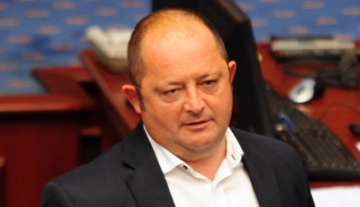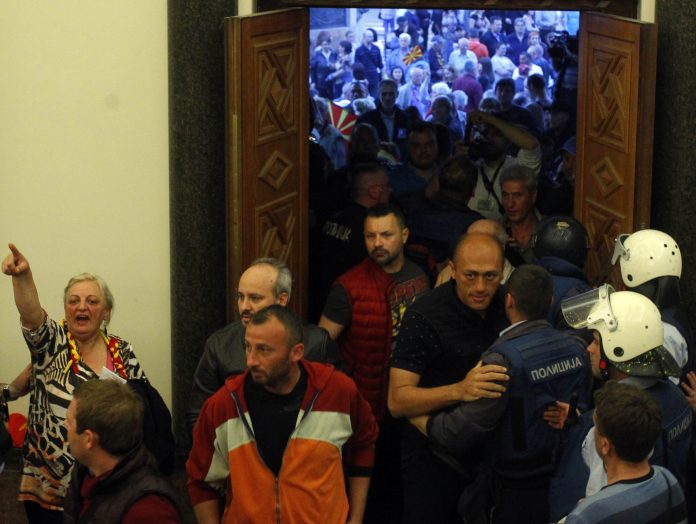The family of former member of Parliament Krsto Mukoski suffered a major tragedy when his 19 year old son Milan was killed in a car crash. The boy was driving on the Struga – Vevcani road overnight in his Audi when he swerved off the road and crashed.
The town of Vevcani came together for the grieving family. The accident struck just as the traditional Vevcani carnival was about to begin, and hundreds of citizens were donning masks. Organizers decided to cancel the entertainment portion of the event as a sign of respect for the Mukoski family.
There was strong public reaction across the country as well, especially considering that Krsto Mukoski is one of the three VMRO-DPMNE members of Parliament who were blackmailed and bribed to vote for the imposed name change. Following the failed name change referendum in 2018, the Zaev regime, with full support of US and EU officials, decided to get to the necessary 81 votes to amend the Constitution by any means necessary. Mukoski and two other VMRO representatives were charged with terrorism over the April 27th incident in the Parliament, when pro-VMRO protesters stormed the building trying to prevent the establishment of a Government dominated by the pro-name change SDSM party and its Albanian partners. Mukoski famously opened the door to the Parliament helping the thousands of protesters in.
He and the other representatives were kept in detention until they relented to the pressure and agreed to break their promise to the voters not to support the name change. As soon as the group flipped – joined by six other members of Parliament who also faced other, lesser criminal charges, charges against family members or took bribes – the imprisoned representatives were released from prison and escorted to Parliament for the vote.

This move caused outrage in the public, leading to frequent labels of “traitors” against the nine members of Parliament. On the other hand, the group was hailed by European and US officials as a pro-Western grouping and and briefly presented as a faction in VMRO, until it became clear that they have little public support and were expelled from the party. Some of the group later formally joined SDSM and its coalition, being appointed to comfortable Government jobs or diplomatic posts. Others, including Mukoski, received public contracts or had family members hired in the public sector, as reward for their vote and the attempts to splinter VMRO-DPMNE.
With all this heavy backstory, and considering the deep divisions in the Macedonian public over the imposed name change and the long-lasting political crisis, many ugly comments were seen across the social media after the news of the tragedy broke. Mukoski and the other members of Parliament who flipped their votes received pardons for the politically motivated charges, but a dozen protesters remain imprisoned under the outrageous “terrorism” charges, and regime representatives sometimes publicly offer to release them in exchange for political concessions from the opposition.
These developments have contributed to the collapse of the rule of law in Macedonia, which is now being acknowledged even by international representatives who once called for the use of ugly “Balkan tactics” to make sure that the votes to rename Macedonia are found. As the country heads to elections, divisions are deepened with the failure of the EU integration process and the new demands for concessions, this time from Bulgaria, in response to which the regime again attempted to find “cooperative” members of Parliament from the opposition, but failed in its quest.





Comments are closed for this post.